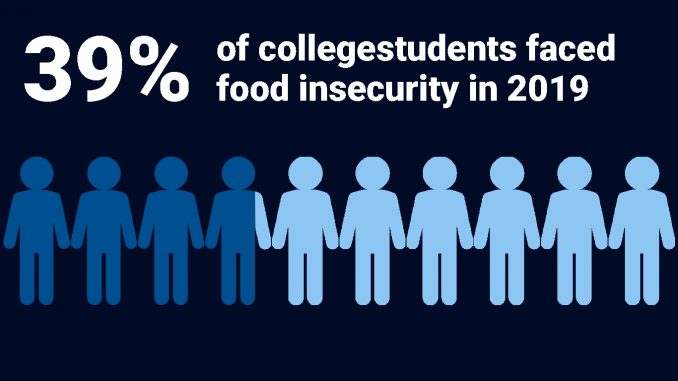
For the first time in its 33-year history, the National Postsecondary Student Aid Study will ask students about food insecurity in a report slated to be released in 2022.
From March to November, the NPSAS will ask 150,000 undergraduate and graduate students from more than 3,000 colleges and universities questions about their ability to buy food, according to the National Center for Education Statistics.
The decision comes amid a growing movement to recognize food insecurity as a pressing issue among college students, spurred by the U.S. Government Accountability Office’s finding of “increasing evidence” that some college students were experiencing food insecurity that could harm their academic success, according to a 2018 report.
“Having the data available in a very publicly facing and mainstream way is a crucial first step to create change,” said Liz Looker, a senior research project manager at the Hope Center for College, Community, and Justice, a Temple-based research hub focused on basic needs insecurity among college students.
Since they began researching basic needs insecurity, the Hope Center has advocated for the federal government to gather data on food insecurity among college students.
“The Hope Center created the #RealCollege survey to fill a knowledge gap: no government agency — at either the federal or state level — collects information on the security of students’ basic needs,” wrote the #RealCollege survey’s six authors.
In 2019, 39 percent of respondents to the #RealCollege survey indicated they were food insecure in the past 30 days. More than one-third of students at four-year colleges said they worried whether their food would run out before they got money to buy more.
The NCES added questions about the topic to the NPSAS, which is conducted every four years, after receiving inquiries from The Hope Center, the Department of Education and other groups, according to the NCES.
“Through the outreach of these groups, NCES realized that this was becoming an increasingly important topic for policymakers and researchers and should be included in NPSAS,” according to the NCES.
NPSAS will provide a nationally representative rate of food insecurity among college students, Looker said.
The questions will ask students if they have ever skipped meals because there was not enough money for food, if they can afford to eat balanced meals and if they lost weight because there was not enough money for food, among other questions, according to the NCES.
While NPSAS does not directly impact federal funding for universities, it is used to help policymakers better understand how the federal government invests in students’ postsecondary education, according to the NCES.
Ava Doskicz, a sophomore advertising major, said having a national survey conducted will help students be less intimidated to talk about their own struggles with food insecurity.
“It’s a good conversation to have and be open about because I feel like a lot of people sometimes are not comfortable talking about what they can afford and what they can’t afford,” Doskicz said.
Gloria Kammer, a sophomore health professions major, said the survey will help the government better understand how to help students.
“That’s one of the most basic human needs, is food and water and shelter,” Kammer said. “If people can’t even get those, then how could they be expected to get an education?”



Be the first to comment